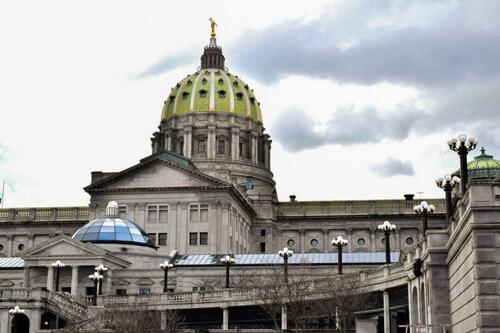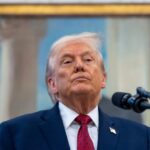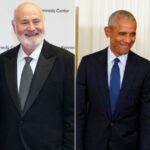
Authored by Beth Brelje via The Epoch Times (emphasis ours),
A group of 24 Republican legislators in Pennsylvania have filed a federal complaint against President Joe Biden, Gov. Josh Shapiro, and representatives of the Pennsylvania Department of State, saying they have usurped the authority of the legislature by changing voter registration and election rules.

The legislators say the Elections Clause and the Electors Clause of the U.S. Constitution give state legislators the sole constitutional right to determine the manner of elections, and there is no role for the president, governor, or other executive officials, such as the secretary of state, to create, rewrite, or disregard the laws established by the legislature. The group alleges they have been unconstitutionally excluded from the law-making process regulating federal elections for president and Congress.
The plaintiffs are Pennsylvania state Reps. Dawn Keefer, Timothy Bonner, Barry Jozwiak, Barbara Gleim, Joseph Hamm, Wendy Fink, Robert Kauffman, Stephanie Borowicz, Donald (Bud) Cook, Paul Michael Jones, Joseph D'Orsie, Charity Krupa, Leslie Rossi, David Zimmerman, Robert Leadbeter, Dan Moul, Thomas Jones, David Maloney, Timothy Twardzik, David Rowe, Joanne Stehr, Aaron Bernstine, Kathy Rapp, and state Sen. Cris Dush.
Their complaint in U.S. District Court for the Middle District of Pennsylvania asks a judge to declare three actions unconstitutional: a voter registration executive order made by President Biden; a voter registration action by Mr. Shapiro, and some Department of State directives. They also request that the judge issue an order prohibiting the president, governor, or state executives from making future changes to the elections process in Pennsylvania without following the legislative process.
Biden’s Executive Order
The legislature alone must provide elections regulations, including those relating to the registration of voters, the court papers say.
In 2021, President Biden signed Executive Order 14019 for “promoting access to voting,” requiring all federal agencies to develop a plan to increase voter registration and participation.
In response, the U.S. Department of Health and Human Services (HHS) announced in 2022 that federal health centers across the nation now have the discretion to participate in activities—including voter registration—that are outside the scope of the health center program project.
“Such voter registration activities may include making available voter registration materials to patients, encouraging patients to register to vote, assisting patients with completing registration forms, sending completed forms to the election authorities, providing voter registration materials in waiting rooms, and allowing private, non-partisan organizations to conduct on-site voter registration,” the HHS website says.
The U.S. Department of Housing and Urban Development instructed more than 3,000 public housing authorities managing some 1.2 million public housing units across the country to run voter registration drives in those units.
The U.S. Department of Education sent a letter to universities, directing them to use Federal Work Study funds “to support voter registration activities.” The letter said: “If a student is employed directly by a post-secondary institution, the institution may compensate a student for [Federal Work Study] employment involving voter registration activities that take place on or off-campus.”
The U.S. Department of Agriculture issued letters to state agencies administering the Supplemental Nutrition Assistance Program (SNAP) and the Women’s Infants and Children’s (WIC) low-income food program, instructing them to carry out voter registration activities with federal funds.
The legislators say voter registration drives are not a government function.
“Typically, private parties—including plaintiffs, campaigns, political parties, and organizations—conduct voter registration drives as acknowledged and regulated by federal campaign finance laws,” the court papers say. “Federal campaign finance laws apply to private parties’ voter registration activities. Voter registration drives … are a federally recognized private function, not a government function.”
President Biden’s executive order also directed federal agencies to use taxpayer money to choose “approved, nonpartisan third-party organizations and state officials to provide voter registration services on agency premises.”
The Pennsylvania state legislators have, through legislative acts, passed a law that prohibits the influence of third-party entities in elections. The executive order contradicts Pennsylvania state election laws, court papers say.
Shapiro’s Automatic Voter Registration
In September 2023, Mr. Shapiro announced in a press release that he was changing voter registration laws by enacting automatic voter registration. According to the press release, anyone eligible to vote is automatically registered to vote when they get their driver’s license.
Pennsylvania lawmakers have tried several times, using the legislative process, to implement automatic voter registration in Pennsylvania. Every attempt has failed. At the time Mr. Shapiro announced this change, there was another bill pending in the legislature to enact automatic voter registration. Lawmakers in the court filing say Shapiro’s action was not legally authorized by any state law.
“Governor Shapiro’s edict instituting automatic voter registration in Pennsylvania is inconsistent with existing Pennsylvania law,” the court filing says. “Governor Shapiro does not have the unilateral power to oversee and participate in making legislative decisions regarding the times, places, and manner of Presidential and Congressional elections, including the registration of electors in Pennsylvania.”
A spokesperson for the Pennsylvania Department of State (DOS) called that claim “groundless,” and told The Epoch Times in an email that state law grants the Secretaries of the Commonwealth and Transportation broad authority to determine the form of Pennsylvania’s combined driver’s license and voter registration form. The changes to the voter registration process through the Department of Transportation in September have resulted in a 44 percent increase in new voter registrations over the same time period two years ago, and are “consistent with both the National Voter Registration Act and Pennsylvania law,” the DOS said.
Department of State Directives
The Pennsylvania Department of State has issued numerous directives that contradict laws established by the legislators, according to court papers, including a 2018 directive concerning Help America Vote Act (HAVA) matching drivers’ licenses or Social Security numbers for voter registration applications. This guidance instructs Pennsylvania counties to register applicants even if an applicant provides invalid identification.
State legislators say they passed a law regarding verification of information on voter registration applications, but directives issued through the Department of State contradict state election laws.
This created confusion in counties as local officials had two sets of directions—one from the Legislature and one from the Department of State.
The DOS told The Epoch Times the HAVA-Matching Directive issued in 2018, is also “fully consistent with applicable law and remains active.”
“If permitted to stand, similar directives can occur again in the future,” court papers say.
The Epoch Times asked the governor’s office for comment for this story.
Authored by Beth Brelje via The Epoch Times (emphasis ours),
A group of 24 Republican legislators in Pennsylvania have filed a federal complaint against President Joe Biden, Gov. Josh Shapiro, and representatives of the Pennsylvania Department of State, saying they have usurped the authority of the legislature by changing voter registration and election rules.

The legislators say the Elections Clause and the Electors Clause of the U.S. Constitution give state legislators the sole constitutional right to determine the manner of elections, and there is no role for the president, governor, or other executive officials, such as the secretary of state, to create, rewrite, or disregard the laws established by the legislature. The group alleges they have been unconstitutionally excluded from the law-making process regulating federal elections for president and Congress.
The plaintiffs are Pennsylvania state Reps. Dawn Keefer, Timothy Bonner, Barry Jozwiak, Barbara Gleim, Joseph Hamm, Wendy Fink, Robert Kauffman, Stephanie Borowicz, Donald (Bud) Cook, Paul Michael Jones, Joseph D’Orsie, Charity Krupa, Leslie Rossi, David Zimmerman, Robert Leadbeter, Dan Moul, Thomas Jones, David Maloney, Timothy Twardzik, David Rowe, Joanne Stehr, Aaron Bernstine, Kathy Rapp, and state Sen. Cris Dush.
Their complaint in U.S. District Court for the Middle District of Pennsylvania asks a judge to declare three actions unconstitutional: a voter registration executive order made by President Biden; a voter registration action by Mr. Shapiro, and some Department of State directives. They also request that the judge issue an order prohibiting the president, governor, or state executives from making future changes to the elections process in Pennsylvania without following the legislative process.
Biden’s Executive Order
The legislature alone must provide elections regulations, including those relating to the registration of voters, the court papers say.
In 2021, President Biden signed Executive Order 14019 for “promoting access to voting,” requiring all federal agencies to develop a plan to increase voter registration and participation.
In response, the U.S. Department of Health and Human Services (HHS) announced in 2022 that federal health centers across the nation now have the discretion to participate in activities—including voter registration—that are outside the scope of the health center program project.
“Such voter registration activities may include making available voter registration materials to patients, encouraging patients to register to vote, assisting patients with completing registration forms, sending completed forms to the election authorities, providing voter registration materials in waiting rooms, and allowing private, non-partisan organizations to conduct on-site voter registration,” the HHS website says.
The U.S. Department of Housing and Urban Development instructed more than 3,000 public housing authorities managing some 1.2 million public housing units across the country to run voter registration drives in those units.
The U.S. Department of Education sent a letter to universities, directing them to use Federal Work Study funds “to support voter registration activities.” The letter said: “If a student is employed directly by a post-secondary institution, the institution may compensate a student for [Federal Work Study] employment involving voter registration activities that take place on or off-campus.”
The U.S. Department of Agriculture issued letters to state agencies administering the Supplemental Nutrition Assistance Program (SNAP) and the Women’s Infants and Children’s (WIC) low-income food program, instructing them to carry out voter registration activities with federal funds.
The legislators say voter registration drives are not a government function.
“Typically, private parties—including plaintiffs, campaigns, political parties, and organizations—conduct voter registration drives as acknowledged and regulated by federal campaign finance laws,” the court papers say. “Federal campaign finance laws apply to private parties’ voter registration activities. Voter registration drives … are a federally recognized private function, not a government function.”
President Biden’s executive order also directed federal agencies to use taxpayer money to choose “approved, nonpartisan third-party organizations and state officials to provide voter registration services on agency premises.”
The Pennsylvania state legislators have, through legislative acts, passed a law that prohibits the influence of third-party entities in elections. The executive order contradicts Pennsylvania state election laws, court papers say.
Shapiro’s Automatic Voter Registration
In September 2023, Mr. Shapiro announced in a press release that he was changing voter registration laws by enacting automatic voter registration. According to the press release, anyone eligible to vote is automatically registered to vote when they get their driver’s license.
Pennsylvania lawmakers have tried several times, using the legislative process, to implement automatic voter registration in Pennsylvania. Every attempt has failed. At the time Mr. Shapiro announced this change, there was another bill pending in the legislature to enact automatic voter registration. Lawmakers in the court filing say Shapiro’s action was not legally authorized by any state law.
“Governor Shapiro’s edict instituting automatic voter registration in Pennsylvania is inconsistent with existing Pennsylvania law,” the court filing says. “Governor Shapiro does not have the unilateral power to oversee and participate in making legislative decisions regarding the times, places, and manner of Presidential and Congressional elections, including the registration of electors in Pennsylvania.”
A spokesperson for the Pennsylvania Department of State (DOS) called that claim “groundless,” and told The Epoch Times in an email that state law grants the Secretaries of the Commonwealth and Transportation broad authority to determine the form of Pennsylvania’s combined driver’s license and voter registration form. The changes to the voter registration process through the Department of Transportation in September have resulted in a 44 percent increase in new voter registrations over the same time period two years ago, and are “consistent with both the National Voter Registration Act and Pennsylvania law,” the DOS said.
Department of State Directives
The Pennsylvania Department of State has issued numerous directives that contradict laws established by the legislators, according to court papers, including a 2018 directive concerning Help America Vote Act (HAVA) matching drivers’ licenses or Social Security numbers for voter registration applications. This guidance instructs Pennsylvania counties to register applicants even if an applicant provides invalid identification.
State legislators say they passed a law regarding verification of information on voter registration applications, but directives issued through the Department of State contradict state election laws.
This created confusion in counties as local officials had two sets of directions—one from the Legislature and one from the Department of State.
The DOS told The Epoch Times the HAVA-Matching Directive issued in 2018, is also “fully consistent with applicable law and remains active.”
“If permitted to stand, similar directives can occur again in the future,” court papers say.
The Epoch Times asked the governor’s office for comment for this story.
Loading…





